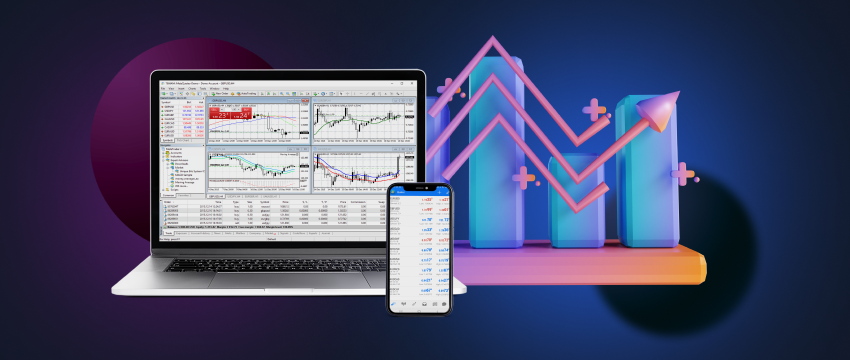Why trade shares, continue to read and learn more. Trading shares involves buying and selling company shares listed on a stock exchange. Traders choose to trade shares as a way to potentially profit from price movements.
In stock trading, a trader will buy a share at a low price and then sell it at a higher price in order to take advantage of the price difference. On the other hand, a stock investor will buy and hold a share for a longer period of time.

Trading real shares or share CFDs?
When buying or selling shares, traders can do so by actually buying the share or, alternatively, trading derivatives of the underlying asset. Such a derivative is a CFD or Contracts For Difference which allows traders to speculate on the price change of a share without owning it.
In this article, we look at what trading shares involve, the advantages of shares trading and how to start trading shares with CFDs.
What are shares trading?
So, have you heard about stocks? Basically, they give you a slice of ownership in a company that’s listed on a stock exchange. When a company wants to raise more money than what it can get from its private investors or banks, they usually decide to ‘go public’ and list its stock on the exchange. That way, people like you and me can buy shares and become part-owners of the company.
So, when a company wants to sell its shares on a stock exchange, it usually does so through an initial public offering (IPO) on the primary market. This takes the company from being solely owned by private investors to having a mix of private and public shareholders. Once the shares start trading on the secondary market, which is basically a stock exchange, the price of the shares goes up and down based on what investors think the stock is worth. So, throughout the trading day, the value of the stock can change quite a bit.

What influences the price of shares?
So, you know how stock prices can change a lot during the day or over a longer period of time? Well, there are a lot of different things that can cause those changes. Some of them have to do with the company itself, like how much money it’s making or how profitable it is. But there are also external factors that can play a role, like the overall state of the economy or any major political issues that might be happening. All of these things can affect how investors view the stock and, in turn, impact its price.
Economy
Did you know that the state of the overall economy can have a big impact on the stock market? If the economy is doing really well and growing quickly, that usually means good things for most companies, which can cause their stock prices to go up. On the flip side, if the economy is in a recession or not doing so well, that can cause stock prices to go down, even if individual companies are doing well. It’s kind of like a rising tide lifting all boats, or a sinking tide lowering them.
실적 보고서
As we mentioned, the stock market can be affected by a company’s financial performance. Well, one of the main ways investors can get a sense of how a company is doing is by looking at its financial reports. These reports usually come out every few months and show things like how much money the company is making from sales and other activities, and how much profit they’re generating.
These reports are really important because they give investors a sense of how healthy the company is and how it’s likely to perform in the future. If a company is doing well and making more money than expected, that can cause its stock price to shoot up. But if it’s not doing as well as expected, the stock price might take a hit. And if the company pays dividends to its shareholders, the earnings report will also show how much those dividends will be worth.
Politics
Government policies and elections can really impact the stock market. So, when it comes to companies that deal with international trade, political events can have a massive effect on them, including wars, trade wars or big political changes such as Brexit.
수요와 공급
How many people want to buy and sell a company’s products or services can influence how well it’s doing financially. And the same goes for the demand for the company’s stock.
But it’s not just regular people driving demand – institutional investors can also play a big role. When a big player like that decides to sell their stocks, it can really affect the price. And when a stock gets added to an exchange-traded fund, that can also cause some movement.
시장 심리
Do you know how sometimes share prices can be way different from what you’d expect based on how well a company’s doing? Well, a big reason for that is because people’s feelings and opinions can really influence the market.
Sometimes traders and investors will make decisions based on things like news stories, what other companies in the same industry are doing, or new information that comes out. And that can cause stock prices to go up or down, even if it doesn’t really match up with the company’s actual performance.
CFD trading
So, Contracts for Difference (CFDs) can help traders make bigger trades and speculate on how a company’s stock price will move, without actually owning the stock. They do this by using a margin. However, it’s important to remember that CFDs can be risky because they’re leveraged, which means that both profits and losses can be a lot bigger. But, even buying shares without leverage can also be risky, so it’s good to always be aware of the risks involved.

How to trade share CFDs
If you’re interested in trading stocks using CFDs, it basically involves a broker agreeing to pay you the difference between the opening and closing price of a security. You can either take a long position, where you’re speculating that the price will rise, or a short position, where you’re speculating that the price will fall. To get started, you can create an account with a CFD provider like T4Trade. You don’t need a separate stock trading account, you can trade share CFDs alongside other CFDs on commodities, indices and forex, all in one trading account.
Why trade share CFDs with T4Trade?
T4Trade offers margin trading so traders can trade share CFDs with limited funds in their accounts. It’s important to note that CFDs are leveraged products, which means that gains and losses can be amplified.
When trading share CFDs, the trader is only speculating on whether the stock price will rise or fall, and can take a short or long position based on their trading objectives. While CFD trading shares similarities with traditional trading strategies, it tends to be shorter-term in nature due to overnight charges.
T4Trade offers an extensive educational library with useful resources to help you trade shares.
Sign up with T4Trade and use our mobile or web trading apps or download MT4 and trade CFDs easily and safely.
Disclaimer: This material is for general informational & educational purposes only and should not be considered investment advice or an investment recommendation. T4Trade is not responsible for any data provided by third parties referenced or hyperlinked, in this communication.




